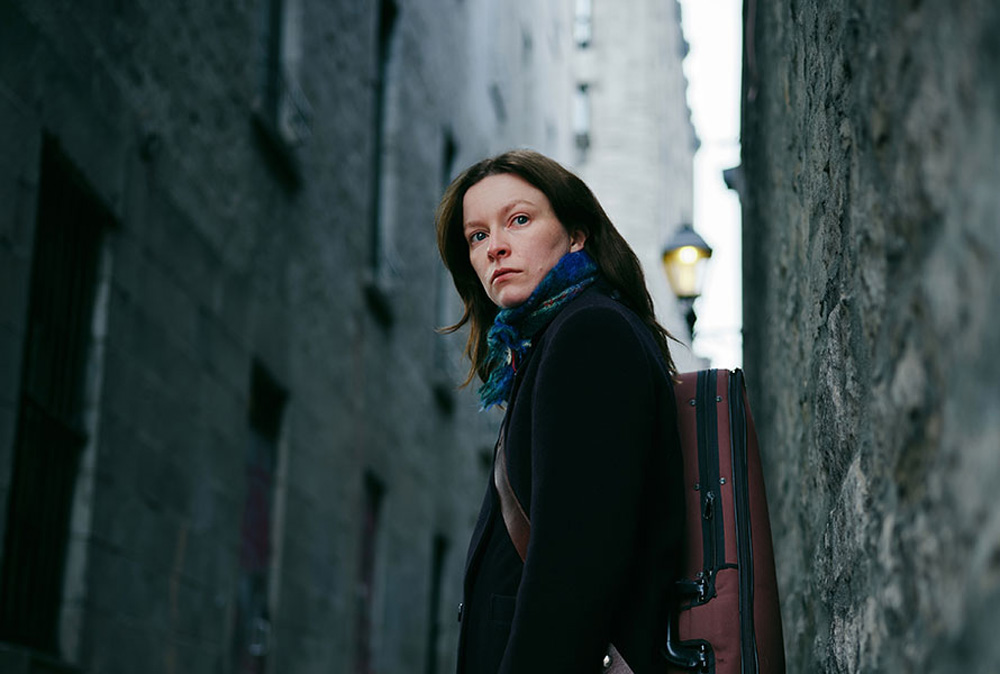You can only get so close to history as Audrey Benac (Deragh Campbell) finds walking through the house where the violinist Kathleen Parlow spent much of her youth in “Measures for a Funeral.” The grad student has settled on completing a thesis on the musician and has become so familiar that she can recreate poses she can remember of Parlow from pictures taken a century earlier, but while she had something to cling onto, perhaps a tea kettle in the kitchen or a gardening tool outside, Audrey’s hands are empty, attempting to grasp something that lies just out of reach in spite of all the effort she’s put into bringing herself within striking distance.
Those who saw Sofia Bohdanowicz’s feature debut “MS Slavic 7” or shorts “Point and Line to Plane” and “Veslemøy’s Song” will recognize Audrey, a diligent researcher who hasn’t left much time outside of her studies to create any history of her own to speak of. If that meant having her passion stirred in an unrequited love affair expressed in letters before in “MS Slavic 7,” Bohdanowicz considers the flip side of the coin in her splendid second feature, watching her longtime lead ignore the present at her peril, diving headlong into Parlow’s papers as she comes to the end of a five-year relationship with an unnamed partner and will lose her mother, with whom she has a fraught connection, sooner than later. For those already acclimated, to watch Audrey slip her hands into white gloves preparing to sift through archives can feel a bit like watching Tom Cruise get ready to jump out of an airplane in “Mission Impossible” and Bohdanowicz sees her off on a proper adventure, having to travel all across Canada and eventually Norway as part of her research, yet the more her itinerary grows, the more it can look like she’s running away from the issues piling up back home, with calls from her mother’s hospice going unreturned as she retraces Parlow’s footsteps.
Bohdanowicz has only refined an already impressive gift for making the past tactile when parchment that passes through Audrey’s fingers can send shivers up one’s spine with the meaning it clearly holds for her, and in “Measures for a Funeral,” the researcher saddles herself with a violin that belonged to her grandfather who was said to study with Parlow at one time, perhaps to remind herself of why she’s pursuing what she is, but its weight growing beyond what she should reasonably have to carry. At times, friends and thesis advisors can be a bit too direct in describing Audrey’s problems to her when the director and Campbell, who co-wrote the screenplay together, occasionally put a fine point on concerns that should remain abstract. But more often than not, Bohdanowicz finds some extraordinary visual expression for what the character is holding inside or the way in which losing herself in her work could be the path to total oblivion, staging one of the film’s most riveting scenes in the Oak Barn where Parlow lived in the 1920s, reenvisioning the plastic sheets that have been put up to protect windows as light pours in to become ghosts that Audrey has to barrel through during an increasingly desperate search to uncover what she’s after without entirely knowing what that is.
All the digging does have at least one obvious reward when Audrey unearths a lost performance piece — Johan Halvorsen’s Violin Concerto, Opus 28 that was composed for Parlow when she was a child prodigy in 1909, and really was only recently found in the basement of the University of Toronto – and she sets about staging a concert that will revitalize the music. But whereas most filmmakers might consider that a triumph in itself, Bohdanowicz and Campbell are admirably after something far more complicated when reviving the past is a troubling substitution for any personal growth on Audrey’s part in the life she currently leads, comparing herself to Parlow when having no other frame of reference for what she’s experiencing is terrifying and the musician’s example isn’t an ideal fit for what she’s going through.
By now, Campbell has a sixth sense for the character, riddled with social anxieties around people her own age but fiercely determined when she’s amongst the friends she finds on the shelves of university archives, and the grand journey that’s going on in Audrey’s head is given robust reinforcement with Olivier Alary’s majestic score that honors Parlow with its intricate use of strings and cinematographer Nikolay Michaylov’s canny use of a wide frame for a film that can feel epic and isolating. As troubling as it can be that Audrey’s only interest is in history that’s already been settled, one can be comforted in how committed Bohdanowicz is in taking audiences somewhere new even as she sees how firmly the past lives side-by-side with the present and in “Measures for a Funeral,” excitement lies in the filmmaker’s ability to bring anything that’s buried up to the surface.
“Measures for a Funeral” does not yet have U.S. distribution. It will next play at the Vancouver Film Festival on September 30th at Fifth Avenue at 8:15 pm and October 1st at International Village on October 1st.




